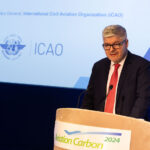A project with a proposed entry into service by 2026 of an all-electric passenger aircraft on domestic routes in Norway has been shelved after extensive research by the plane’s developer, Tecnam, concluded a short battery life would make it commercially unviable. The Italian airframer had partnered with Rolls-Royce to develop a zero-emission, high-utilisation capability platform called P-Volt, with the partnership extended to include Norwegian operator Widerøe in early 2021 The country’s biggest regional airline has a large domestic network where flight distances are less than 275 km. However, after a three-year study covering the entire life-cycle of an all-electric aircraft, Tecnam has decided, at least for now, that even under optimistic projections, operators would need to replace the entire battery storage unit after only a few hundred flights, with a dramatic increase in direct operating costs due to the reserves for battery replacement prices.
“Since the beginning of the P-Volt development, Tecnam’s focus has been to provide operators with the ability to fly an all-electric passenger aircraft profitably, efficiently and sustainably in terms of operating costs, emissions, performance, turnaround and time to market,” said a company statement. “At present, Tecnam believes that these can only be achieved by extremely aggressive speculation on uncertain technology developments.
“The proliferation of aircraft with ‘new’ batteries would lead to unrealistic mission profiles that would quickly degrade after a few weeks of operation, making the all-electric passenger aircraft a mere ‘green transition flagship’ rather than a real player in the decarbonisation of aviation.”
Under the company’s most optimistic future scenario of slow charge cycles and the possible limitation of the maximum charge level per cycle, the real storage capacity would fall below 170Wh/kg, whereas by comparison, jet fuel has an energy density of 12,000Wh/kg.
Tecnam said the programme was being postponed rather than cancelled and is “ready to bring the P-Volt back into the type certification arena as soon as technology evolution allows.”
Fabio Russo, the company’s Chief R&D Officer, added: “We hope that new technologies will make businesses viable sooner rather than later and we have real confidence in our partners’ ability to bring highly valuable products to the zero-emission powertrain and energy storage arena.”
The P-Volt is based on the 11-seat Tecnam P2012 Traveller aircraft and seen as ideal for short take-off and landing, as well as for Widerøe’s routes along the north and west coast of Norway. The airline’s shortest flight durations are between seven and 15 minutes. In March, it announced the three-year Widerøe Zero project, which, with backing from Norway’s Research Council, will explore possible operating concepts for both a nine-seater electric aircraft and an eVTOL aircraft.
The country has an ambition of having the first electrified aircraft in ordinary domestic scheduled flights by 2030 and an 80% emissions reduction from domestic flights by 2040.
Image: Tecnam’s P-Volt all-electric aircraft in Widerøe livery















More News & Features
New partnerships formed to drive e-SAF production in Nordic markets
Heart Aerospace unveils full-scale 30-seat hybrid-electric aircraft demonstrator
Loganair and Heart partner on UK electric flight, while magniX and NASA unveil US e-test aircraft
Dovetail gets Australian state support and secures seaplane electric conversion deal from Norway
European aerospace supplier Aciturri takes key stake in Dovetail Electric Aviation
Hybrid electric flight pioneer Ampaire ground tests Dimensional Energy e-fuel